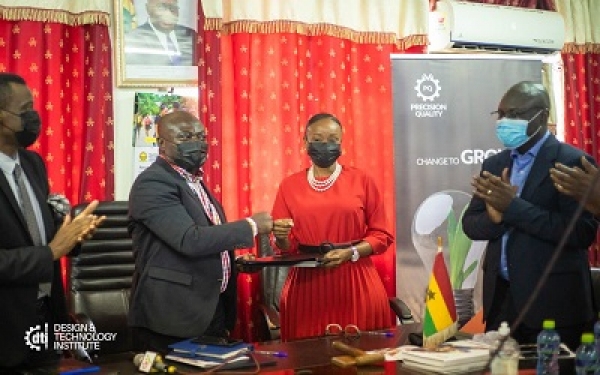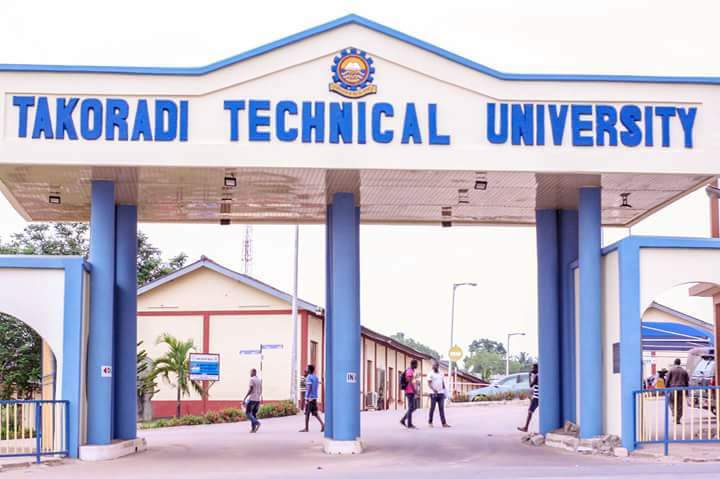Takoradi Technical University gets TVET support from DTI
- Posted on
- Comment

The Design and Technology Institute (DTI) has signed a memorandum of understanding (MoU) with the Takoradi Technical University (TTU) to strengthen the implementation of the Precision Quality (PQ) training programme towards improving technical and vocational education and training (TVET) delivery in Ghana.
DTI also upgraded and handed over an ultra-modern TVET workshop equipped with state-of-the-art precision hand tools to the TTU as part of the MoU.
The MoU with the Takoradi Technical University forms part of DTI’s collaborative strategy to work with stakeholders to reach the objective under the ‘Transforming Youth TVET Livelihood for Sustainable Jobs’ project in partnership with the Mastercard Foundation’s ‘Young Africa Work Strategy’, which seeks to enable three million young people, particularly women, to access dignified and fulfilling work opportunities by 2030.
The three-year project seeks to create 40,000 direct and indirect work opportunities for the youth, especially young women, through TVET.
DTI launched the Precision Quality (PQ) programme to policymakers, academia and key industry players at a conference in Accra on February 11, 2021. At the conference, stakeholders agreed that Precision Quality will be key to enhancing the skills and work of master craft persons and artisans to meet global industry standards.
DTI, in fulfilling its commitment to the partnership with the Mastercard Foundation, has unveiled TTU as the second model and demonstration centre to roll out the implementation of the Precision Quality programme. This initiative will be scaled up to other TVET institutions in the coming years.
The PQ training programme was developed by industry players and certified by the Commission for Technical and Vocational Education and Training (CTVET) for introduction into the academic studies of technical universities.
The Chief Executive Officer (CEO) and Founder of DTI, Ms Constance Elizabeth Swaniker, said the PQ curriculum will help position “and equip young people with the requisite skills to create value and secure better jobs in the future. The handing over of the curriculum to the university is, therefore, a major step to ensuring that we maintain the same level of standards in TVET education delivery across the country.”
“At DTI, we are on a journey to work with stakeholders to nurture and develop the next generation of human capital to champion Ghana’s economic growth by adhering to industry standards,” Ms Swaniker added.
The Vice-Chancellor of TTU, Rev Prof Frank Eshun, elated over the collaboration with DTI, noted that “in fact, TTU takes this memorandum of understanding (MoU) as a critical component of our vision to become a centre of excellence in technical and vocational education both in Ghana and sub-Sahara Africa,” he said.
“I have a strong conviction that this MoU will help address the issue of Precision Quality facing our manufacturing industry today so far as international quality standards are concerned. I also believe this partnership will offer job opportunities to our students and make them competitive in the world of work,” he added.
The Western Regional Minister, Mr Kwabena Okyere Darko-Mensah, lauded the efforts of DTI and called on the university to leverage the partnership to train the next generation of human capital for the country.
“The partnership with the Design and Technology Institute is the needed game changer for the youth who are undergoing training at the university. It is my hope that this would unlock the needed skills for the myriads of private sector companies to create wealth for Ghana,” he stated.
Trained academic scale advisors and instructors will train the students extensively in Precision Quality to ensure they gain relevant industry skills and adhere to global industry standards when they graduate to enter the world of work.
The PQ curriculum consists of five training modules, namely change to grow, process integration, people and team development, health and safety in the workplace and managing quality and customer relations.
-The Finder










 (Selorm) |
(Selorm) |  (Nana Kwesi)
(Nana Kwesi)